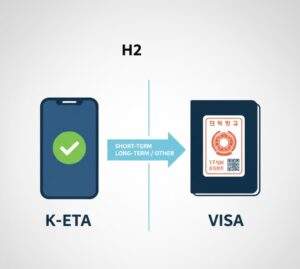Introduction: South Korea Visa & K-ETA
South Korea, a vibrant blend of ancient history and futuristic technology, is a top destination for travelers worldwide. But before you can immerse yourself in the bustling streets of Seoul or the serene landscapes of Jeju Island, there’s a crucial step: understanding the entry requirements. The terms “visa” and “K-ETA” can be confusing, especially with policies frequently changing.
This guide is your definitive resource for navigating South Korea’s entry requirements in 2025. We’ll clarify the difference between a visa and the K-ETA, explain the exciting temporary K-ETA exemption, and provide clear, actionable steps for a seamless travel experience, whether you’re from the US, UK, Canada, Australia, or elsewhere.
K-ETA vs. Visa: What’s the Difference?
Let’s start by demystifying the two key terms you’ll encounter:
- K-ETA (Korea Electronic Travel Authorization): This is an online system for travelers from visa-waiver and visa-free countries. It’s not a visa but a pre-travel authorization that allows the South Korean government to screen visitors before they arrive, enhancing security and streamlining the entry process.
- South Korean Visa: This is a formal document, typically a sticker in your passport, that grants you permission to enter, stay, and in some cases, work or study in the country for a specific period. Visas are required for citizens of countries that do not have a visa-waiver agreement with South Korea, or for those planning long-term stays (over 90 days), employment, or study.
Think of it this way: the K-ETA is for short-term tourism or business for eligible nationalities, while a visa is for all other purposes or for those not eligible for visa-free travel.
The Big News for 2025: Temporary K-ETA Exemption for 22 Countries
To boost tourism, the South Korean government has extended a temporary exemption from the K-ETA requirement for citizens of 22 countries and regions. This exemption is in effect until December 31, 2025.
Who is Exempt from the K-ETA?
If you hold a passport from one of the following countries, you do not need to apply for a K-ETA for a short-term tourist or business visit:
- Australia
- Austria
- Belgium
- Canada
- Denmark
- Finland
- France
- Germany
- Hong Kong
- Italy
- Japan
- Macao
- Netherlands
- New Zealand
- Norway
- Poland
- Singapore
- Spain
- Sweden
- Taiwan
- United Kingdom (UK)
- United States (US) (including Guam)
For travelers from these countries, this is fantastic news. It means one less step and one less fee to worry about for your 2025 trip. You can enter with just your valid passport.
Should You Still Consider Applying for a K-ETA?
Even if you are exempt, you still have the option to apply for a K-ETA. The main benefit of doing so is that you will not have to fill out an arrival card upon landing in South Korea, which can save you time at the airport. The K-ETA application fee is 10,000 KRW (approximately $9-10 USD).
Entry Requirements for Different Nationalities: A 2025 Breakdown
Navigating entry requirements can be tricky, so we’ve broken it down into clear categories.
Category 1: K-ETA Exempt Countries (The Easiest Entry)
As mentioned, if you are a citizen of one of the 22 exempt countries (including the US, UK, Canada, and Australia), your entry process for a short-term stay (typically up to 90 days, 180 days for Canadians) in 2025 is straightforward:
- Valid Passport: Ensure your passport is valid for the duration of your stay.
- e-Arrival Card: Starting from February 24, 2025, travelers exempt from the K-ETA will need to submit an e-Arrival Card online before their trip. This should be done within 72 hours of your arrival.
- That’s it! You do not need a visa or a K-ETA.
Category 2: Visa Free (K-ETA Required) Countries
If your country has a visa-waiver agreement with South Korea but is not on the temporary exemption list, you will need to apply for a K-ETA before you travel.
- Check Eligibility: Visit the official K-ETA website to confirm your nationality requires a K-ETA.
- Apply Online: The application must be submitted on the official K-ETA website at least 72 hours before your departure.
- Pay the Fee: The fee is 10,000 KRW.
- Receive Approval: Once approved, your K-ETA is valid for multiple entries over a three-year period.
Category 3: Visa Required Countries
If your country does not have a visa-waiver agreement with South Korea, you will need to apply for a tourist visa (typically a C-3-9 visa) at the nearest South Korean embassy or consulate.
How to Apply for a South Korean Tourist Visa
The process generally involves the following steps:
- Locate Your Embassy/Consulate: Find the South Korean diplomatic mission responsible for your jurisdiction.
- Complete the Application Form: Fill out the visa application form accurately.
- Gather Required Documents: While specific requirements can vary slightly by embassy, you will typically need:
- A valid passport with at least six months of remaining validity.
- A recent passport-sized photograph.
- Proof of sufficient funds (e.g., bank statements).
- A detailed travel itinerary, including flight and accommodation bookings.
- Payment for the visa processing fee.
- Submit Your Application: Submit your application and documents as instructed by the embassy or consulate. This may need to be done in person or through a designated travel agency.
- Await a Decision: Processing times can vary, so be sure to apply well in advance of your planned travel dates.
Comparison Table: 2025 South Korea Entry Requirements
Conclusion
For travelers from the US, UK, Canada, Australia, and 18 other nations, visiting South Korea in 2025 has become significantly easier thanks to the temporary K-ETA exemption. For others, the K-ETA system remains an efficient process for short-term visits. By identifying which category you fall into and preparing the necessary documents—be it just your passport and an e-Arrival card, a K-ETA, or a visa—you can ensure a smooth and stress-free start to your Korean adventure. Always double-check the latest regulations on the official K-ETA website or with your local South Korean embassy before you travel.
FAQ
Q1: Has the K-ETA exemption for countries like the US and UK been officially extended for all of 2025?
Yes, the temporary K-ETA exemption for the 22 designated countries has been officially extended until December 31, 2025.
Q2: I am from a K-ETA exempt country. Do I need to fill out any forms?
Yes, starting from February 24, 2025, you will need to complete an e-Arrival Card online within 72 hours before your flight to South Korea.
Q3: How far in advance should I apply for a K-ETA if I need one?
It is strongly recommended to apply at least 72 hours before your departure. However, to be safe, applying a week or two in advance is advisable.
Q4: What happens if my K-ETA application is rejected?
If your K-ETA application is rejected, you will need to apply for a visa at a South Korean embassy or consulate to enter the country.
Q5: I am planning to stay in South Korea for 6 months to study. Do I need a visa?
Yes, regardless of your nationality, a stay longer than 90 days for purposes like study or work requires the appropriate visa. The K-ETA and visa-waiver programs are only for short-term tourism and business.
South Korea VISA 2025 Essential Traveler’s PDF Guide.PDF
Hi, I’m [jeybee]. As a long-time resident of Seoul, I’m passionate about uncovering the authentic, everyday magic of Korea. This blog is my way of sharing my favorite spots, tips, and cultural insights with you, beyond the usual tourist traps.




